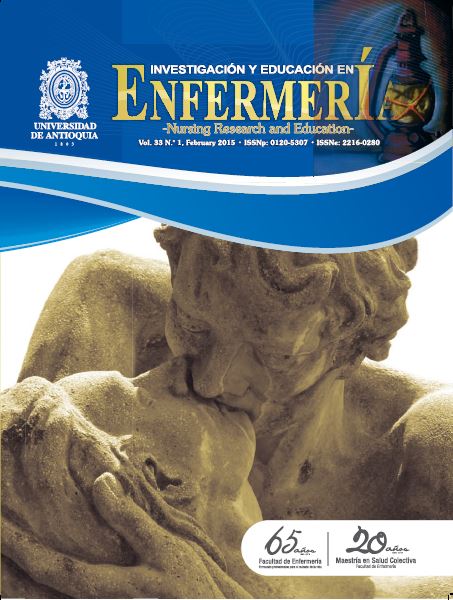The knowledge of expert nurses and the practical-reflective rationality
DOI:
https://doi.org/10.17533/udea.iee.21891Keywords:
Nursing, nursing education, knowledge.Abstract
Objective: To identify the characteristics of an expert nurse.
Methodology: A group of 49 nurses starting their Master’s degree was asked to answer the following question: “Which characteristics and skills distinguish a novice from an expert nurse?” The answers were analyzed and classified based on Bardin’s content analysis.
Results: Through a three-stage classification process, the competences and skills assigned to expert nurses were divided into 17 categories. These nurses showed wide-ranging skills and acquired meta-competencies. Expert nurses are characterized by their leadership, supervision and ability to manage change, as well as their communication and relational skills. They have the ability to act reflectively, plan, systematize and consistently assess; they also show more dexterity. They have more adaptive skills, confidence and achieve a broader view. They are competent while managing conflicts and stress, as well as articulating theory and practice; they create knowledge, make use of research, respond to complex situations and are capable of making decisions.
Conclusion: Expert nurses have anticipation skills, insight, use detailed observation, take immediate action and are able to define priorities; they keep context in mind and have a tendency for specialization.
How to cite this article: Queirós PJP. The knowledge of expert nurses and the practical-reflective rationality. Invest Educ Enferm. 2015; 33(1):
Downloads
References
(1) Benner P. De iniciado a perito: Excelência e poder na prática clínica de enfermagem. 2ª ed. Coimbra: Quarteto; 2001.
(2) Moya JLM. De mapas y territorios. Formalización de los saberes profesionales en el curriculum. Rev Rol Enf. 2008; 31(7-8):533-6.
(3) Moya JLM. Redescubrir el saber práctico de la enfermera. El difícil equilibrio académico y profesional en la España «preeuropea» (III). Rev Rol Enf. 2005; 28(7-8); 487-90.
(4) Benner P, Tanner C, Chelsa C. Expertise in nursing practice: caring, clinical judgment & ethics. 2nd ed. New York: Springer Publishing Company; 2009.
(5) Moya JLM, Esteban MP. La complejidad del cuidado y el cuidado de la complejidad: Un tránsito pedagógico de los reduccionismos fragmentantes a las lógicas no líneales de la complejidad. Texto Contexto Enferm. 2006; 15(2):312-9.
(6) Schön D. La formación de profesionales reflexivos. Hacia un nuevo diseño de la enseñanza y el aprendizaje en las profesiones. Barcelona: Ediciones Paidós; 1992.
(7) Alarcão I, Tavares J. Supervisão da Prática Pedagógica – Uma perspetiva de desenvolvimento da aprendizagem. 2ª ed. Coimbra: Edições Almedina; 2003.
(8) Alarcão I. Escola Reflexiva e nova Racionalidade. Porto Alegre: Artmed Editora; 2001.
(9) Sá-Chaves I. Formação, Conhecimento e Supervisão. Contributos nas áreas da formação de professores e de outros profissionais. Aveiro: Universidade de Aveiro; 2000.
(10) Grundy S. Curriculum: Product or Praxis? London: The Falmer Press; 1987.
(11) Shulman L. Course anatomy: the dissection and analysis of knowledge through teaching. In: Hutchings P editors. The course portfolio. How faculty can examine their teaching to advance practice and improve student learning. Washington: American Association for Higher Education; 1998.
(12) Medina JL. La Pedagogía del cuidado: saberes y prácticas en la formación universitaria en enfermería. Barcelona: Laertes; 1999.
(13) Bardin L. Análise de Conteúdo. Lisboa: Edições 70 Lda; 1995.
(14) Noveletsky H. Reflective Practice: Empowering nursing knowledge. In: Andrist LC, Nicholas PK, Wolf KA. A History of Nursing Ideas. Sudbury: Jones and Bartlett Publishers; 2006. P.409-415.
Downloads
Published
How to Cite
Issue
Section
License
Derechos de propiedad / Direitos de Propriedade
English: If the article is accepted for publication, all copyright will be of exclusive property of Investigación y Educación en Enfermería. The text and the graphics included in the publication are exclusive responsibility of the authors and not necessarily reflect the thought of the Editorial Committee.
Español: Si el artículo es aprobado para publicación, todos los derechos son de propiedad de Investigación y Educación en Enfermería. El texto y las gráficas incluidas en la publicación son de exclusiva responsabilidad de los autores y no necesariamente refleja el pensamiento del Comité Editorial.
Português: Se o artigo for aceito para publicação, todos os direitos autorais serão de propriedade exclusiva de Investigación y Educación en Enfermería. O texto e os gráficos incluídos na publicação são de responsabilidade exclusiva dos autores e não refletem necessariamente o pensamento do Comitê Editorial.















